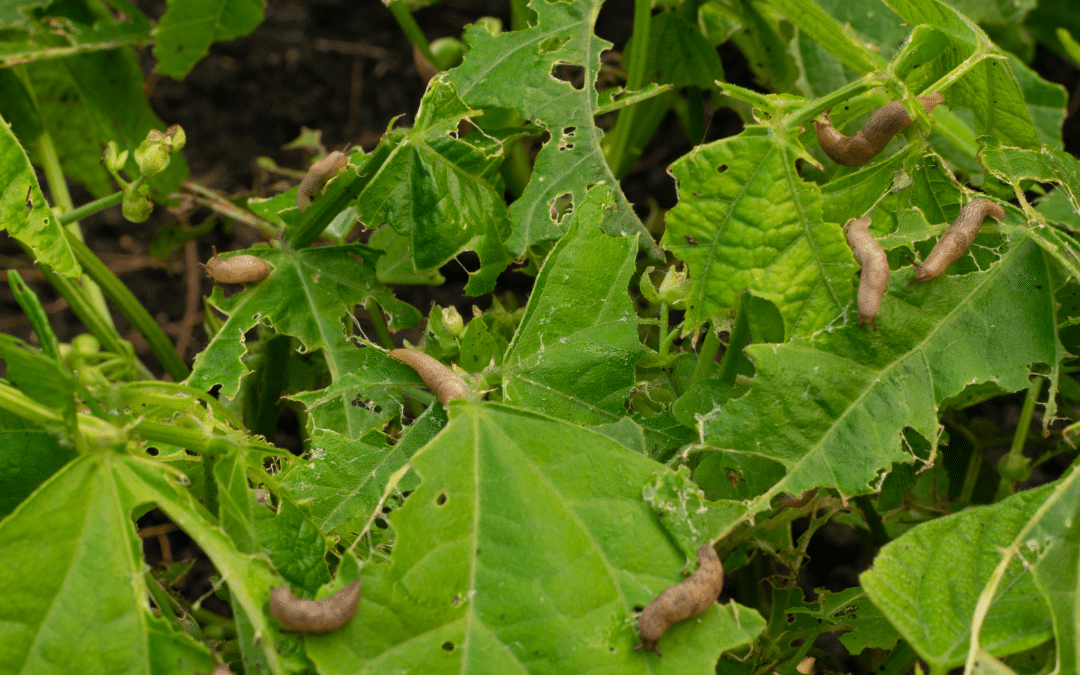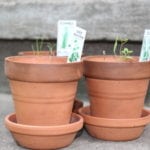We recently moved to a new house and I was so excited to set up a new garden area…only to find that slugs were taking over! There’s nothing more frustrating than spending time and money to grow a garden only for it to be destroyed by slugs. Slugs may seem harmless, but they can cause serious damage to your plants if left unchecked.
Just ask my poor pepper plants…oh wait, you can’t – they’re DEAD! And my cauliflower aren’t far behind…
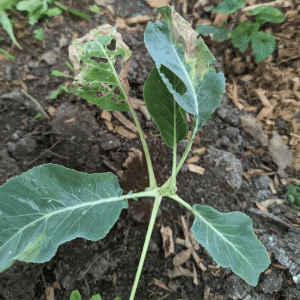
If you’re like me and struggling to eliminate slugs from your garden, I’ve got a few ideas for you. Here you’ll find everything you need to know about slug control, from understanding slug behavior to choosing the best management techniques for your garden. With these tips, you’ll be able to protect your garden and enjoy the fruits of your labor. So let’s dive in and learn how to keep your garden slug-free!
Disclaimer: I’m an Amazon affiliate and the following links may be affiliate links through which I can earn commission should you make a purchase.
Understanding Slug Behavior
Understanding slug behavior is key to knowing how to fight these pests. These slimy creatures prefer cool and damp environments and are typically active during the night. They are also attracted to decaying plant matter and can even climb trees to feed on foliage. Additionally, slugs have a strong sense of smell, allowing them to detect their food from long distances.
While these might seem like helpful traits to the slug, you can actually turn the tables on them and use these qualities against them.
Naturally the best way to prevent slug infestations is by creating an environment that is unattractive to them. You can achieve this by removing excess plant matter or debris from your garden, as this can provide a comfortable shelter for slugs. Additionally, avoid over-watering your garden as this can create a damp environment, perfect for slugs to thrive in. By making your garden less appealing, you can lessen the chances of a slug invasion. So let’s talk more about what that might look like!
Watering in the Morning Helps Prevent Slugs
One way to create a less hospitable environment for slugs is to pay attention to your watering habits. Over-watering not only creates a damp environment that slugs love, but it also weakens plant roots and makes them more vulnerable to damage from slugs. To avoid this, water your garden in the morning. This allows the plants to dry out during the day, making it less attractive for slugs to hang around.
Of all the techniques I go into in this post, this was the most important step I could take to reduce the slug issues in the my garden.
In addition to watering in the morning, there are many other effective slug control techniques to choose from. By combining a variety of methods, you can create a comprehensive approach to keep slugs at bay and protect your garden.,
Choosing the Best Slug Control Techniques
In addition to watering habits, there are several other techniques that can be employed to protect your garden from slugs. One effective method is to physically remove slugs from the garden early in the morning or late at night. A friend of mine lays down cardboard in her pathways at night, soaks it, and in the morning it’s often covered in slugs! This is especially great if you have chickens who can help with the clean up.
There are also various chemical options for slug control, including baits and sprays. However, I personally don’t recommend them or use them, as they can harm beneficial insects and other wildlife. If you do decide to use chemicals, be sure to follow all instructions carefully and never apply them near edible plants or in areas where pets or children may come into contact with them.
Fortunately there are many (MANY!) natural ways to keep slugs out of your garden, many of which won’t cost you a dime! As you may already know, I’m all about gardening on a budget!
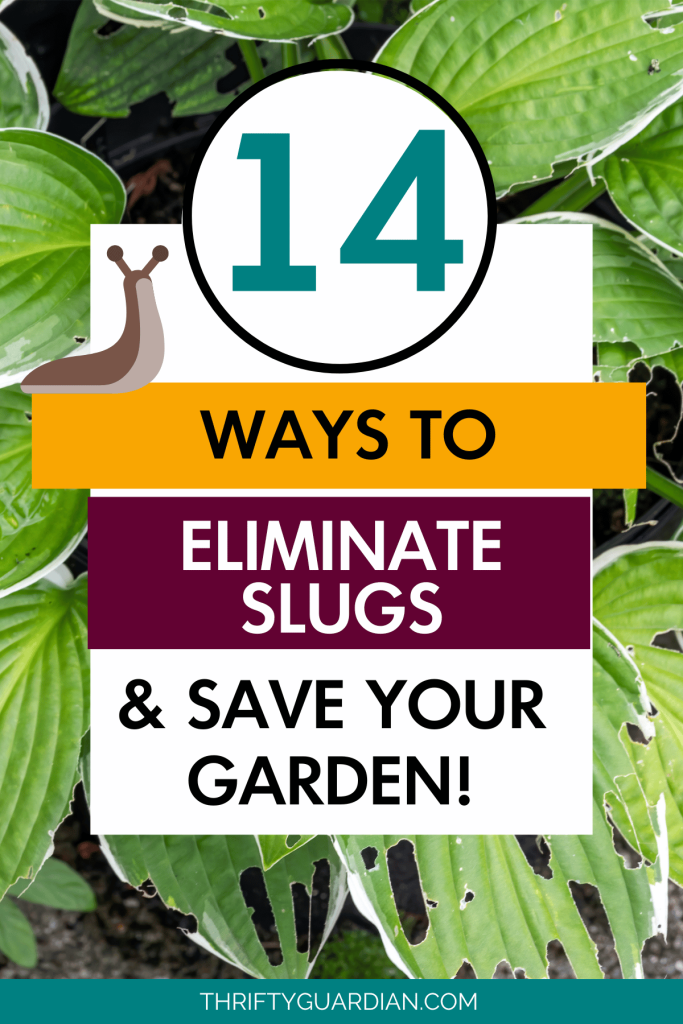
Natural Ways to Keep Slugs Away
In order to effectively protect your garden from slugs, it is important to implement a variety of control measures. Firstly, you can create a physical barrier around your plants to prevent slugs from reaching them. This can be done by applying a copper strip or mesh around the perimeter of your garden bed, as slugs are repelled by copper. Alternatively, you can create a barrier using materials such as eggshells, sand, or coffee grounds. These materials create an abrasive surface that slugs are unable to crawl over.
Companion planting is another effective way to repel slugs. Planting herbs such as thyme, mint, and rosemary around the perimeter of your garden bed can deter slugs due to their strong scent. Additionally, planting plants that slugs dislike, such as fennel, garlic, and chives, can also provide a natural defense against slug infestations.
Beer Traps for Slugs
One effective and popular method for slug control is setting up beer traps. It’s a simple and natural way to attract slugs and prevent them from harming your precious plants. To set up a beer trap, bury a small container, such as a yogurt container, in the soil near the plants that are being targeted. Fill the container with beer until it reaches just below the rim. The slugs will be attracted to the smell of the beer, crawl in, and drown.
Beer traps are an inexpensive and non-toxic solution for slug control. However, it’s important to note that you may need multiple traps in large gardens to effectively control the slug population. Also, be sure to check and refresh the traps regularly, as the beer will lose its attractiveness over time.
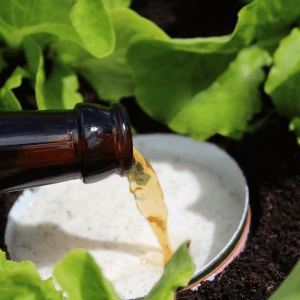
As a sober mom, this is the only method I’ve not tried personally but I’ve heard good things from others who go this route!
Next, let’s explore another common question in slug control: do oranges keep slugs away?
Do Oranges Keep Slugs Away?
Another popular method for deterring slugs is the use of citrus fruits, particularly oranges. The theory behind this is that the strong scent of oranges repels slugs, keeping them away from your garden. However, there is limited scientific evidence to support this claim.
While some gardeners swear by the use of oranges as a deterrent, it’s important to remember that the effectiveness of this method may vary depending on the size and severity of your slug problem. Additionally, using oranges may attract other pests, such as squirrels or rodents, that are attracted to the sweet scent.
That said, this is a totally free way to keep slugs away as you can just use your leftover orange rinds. For this method, I just kept my orange peels in the freezer until I had enough to warrant blending them up and spreading it in my garden. I let them dry out a bit – enough that it wouldn’t cause issues in my blender – then used a spoon to sprinkle around my plants.
If you do decide to give orange peels a try, it’s recommended to scatter them around the perimeter of your garden or individual plants. Be sure to replace the peels regularly as they dry out and lose their effectiveness.
Another option to consider is using coffee grounds as a natural slug control method. Not only do they help to deter slugs, but they can also add beneficial nutrients to your soil.,
Using Coffee Grounds as Slug Control
In addition to trying out orange peels as a slug deterrent, another cost-free option exists in the form of coffee grounds. Not only can these grounds help to repel the slimy pests, but they can also benefit the soil in your garden. Coffee grounds contain high levels of nitrogen, an essential nutrient for plant growth. As the grounds break down, they release this nitrogen into the soil.
It’s important to note which plants like or do not like coffee grounds. Plants that thrive on neutral or alkaline soil, like tomatoes, should NOT be a part of this method. Blueberries, carrots, and radishes, however, will love a dose of your leftover coffee grounds.
To use coffee grounds as a slug control measure, simply scatter them around the perimeter of your garden or around individual plants.
There’s many more natural ways to combat slugs, but one that I often see is diatomaceous earth. The question is though: does it work?
About diatomaceous earth and slugs
Diatomaceous earth, or DE, is a naturally occurring sedimentary rock made up of fossilized diatoms. This substance is often used to help keep pests out of gardens because it is abrasive and can damage their exoskeletons. I first discovered DE when dealing with a water bug problem, using it around my basement windows to help keep those pests away.
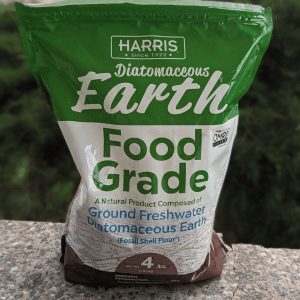
But does DE work for slugs?
Well, the jury is still out on that one. DE may definitely slow the slugs down, but slugs don’t have exoskeletons. It’s possible the DE may cause the slugs to dry out, but it also harms a lot of beneficial insects in the process, such as bees and butterflies. You also have to reapply it any time it rains or you water (which means almost every day in the earlier season!)
While diatomaceous earth can be effective, it may not work as quickly as other slug control methods. I personally prefer to go the Epsom salt route to keep slugs at bay.
Epsom Salts and Slugs
Many gardeners have found success in using Epsom salts as a natural slug deterrent. This is something I always have on hand as I use it in a lot of my self-care techniques! It was also a literal life saver when I was battling cat scratch fever.
Epsom salts (magnesium sulfate) dehydrate slugs and create an environment that is inhospitable to them. To use Epsom salts in your garden, simply sprinkle a generous amount around the base of plants or in areas where slugs are prevalent. Make sure to also reapply after rain or watering.
Also, just like the coffee grounds, make sure you’re using Epsom salts on plants that will benefit from it. Fortunately almost every plant – save for woody and/or tropical plants – typically benefit from Epsom salts. Tomatoes are especially happy with it! Just be mindful not to use too much.
I bought this bag a year ago and I’m only just now getting ready to re-order:
Egg Shells to Keep Slugs Away
Using natural means to control slugs in the garden is an effective and eco-friendly solution. In addition to coffee grounds and Epsom salts, crushed eggshells can also be used to keep slugs away. The sharp edges of the eggshells make it harder for slugs to crawl over them, preventing them from accessing the plants. All you have to do is save your eggshells, crush them into small pieces, and sprinkle them around the base of your plants.
To keep from wasting too much time/energy with this method, try storing your eggshells in a gallon-sized freezer bag. Every time I bake something up – like my infamous banana bread – I toss the egg shells into the freezer. Once the bag is full, I simply smash them up with a rolling pin and sprinkle them out.
Just be sure not to add eggshell to plants that prefer a more acidic soil, like blueberries or azaleas.
Oatmeal Pest Control
If you thought oatmeal was only good for breakfast, think again! Oatmeal can also be used as a natural remedy to control pests in your garden. By creating a barrier of oatmeal around your plants, you can deter slugs from munching on them. When slugs consume oatmeal, it swells up in their stomachs, leading to dehydration and ultimately death.
It’s definitely on the crueler end, but there comes a point where you can only spend so much time and money on your garden before you resort to drastic measures to protect your space.
To use oatmeal as a pest control method, simply grind rolled oats into a fine powder and sprinkle it around the base of your plants. Be sure to reapply after any rainfall to ensure continuous protection.
While oatmeal may not be the most effective slug control method, it can be a helpful addition to your natural pest control arsenal. Next, we’ll take a look at how wool pellets can be used to deter slugs and protect your garden.
Fireflies and Slugs
One of the most interesting ways to fight slugs is to make a firefly-friendly backyard! I discovered this trick thanks to my husband, who was obsessed with planting more native grasses to attract lightning bugs to our yard. While obviously this post is created with the idea of slugs as pests, were it not for slugs, we’d have far fewer fireflies. I honestly had no idea lightning bugs were carnivorous! In fact, lightning bug larvae overwinter in the leaves and guess what their first feast is come Spring? Slugs!
Create a more friendly firefly yard this year and you’ll find a lot less slugs come summer!
Sheep’s Wool and Slugs
I actually came across this method accidentally! Wool pellets make for an amazing fertilizer, as it contains both nitrogen and potassium. Beyond that, though, it holds water really well and definitely helps cut back on time spent watering. It’s also re-usable! And something I’ve found is that the older the wool is, the more it seems to repel slugs. It’s definitely the most costly option of everything listed, but it can absolutely save your plants.
Deter Slugs with Copper Tape
Copper tape is another method you can use to protect your garden from slugs. Supposedly the copper tape emits a small shock of sorts that deters the slugs from crawling over it. Some gardeners use use copper tape by wrapping it around the base of their actual plants.
I think if you’re going to go this route, the best thing to do is to create a barrier around the perimeter of your garden beds. It’s important to make sure there are no gaps in the tape, as slugs are excellent at finding small openings.
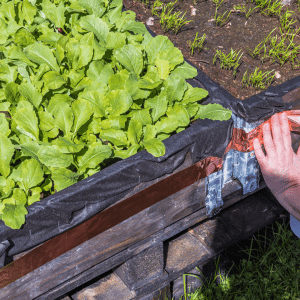
Copper tape can be purchased at most gardening stores and online retailers. It is also reusable, making it a fairly cost-effective option for long-term slug prevention.
While copper tape is a useful tool in deterring slugs, it is important to keep in mind that it won’t completely eliminate them from your garden. Using multiple methods in combination, such as being mindful of your watering schedule and creating barriers, will provide the most effective protection for your plants.
In conclusion, keeping slugs under control is key to maintaining a healthy garden. Understanding their behavior and identifying the different types of slugs in your garden is crucial when choosing the right management techniques. From beer traps and coffee grounds to copper tape and eggshells, there are multiple ways to ward off these slimy pests. Remember to take action at the first sign of an infestation and stay vigilant. A little effort goes a long way in protecting your garden and enjoying its full potential. As the saying goes, “a garden requires patient labor and attention. Plants do not grow merely to satisfy ambitions or to fulfill good intentions. They thrive because someone expended effort on them.” So roll up your sleeves and get to work – your garden will thank you for it.

